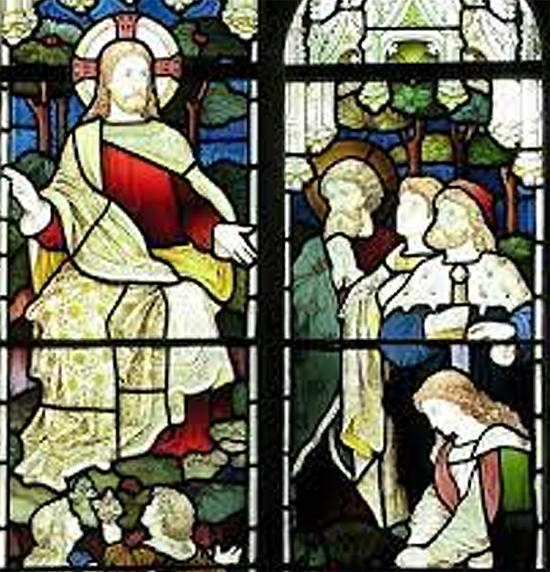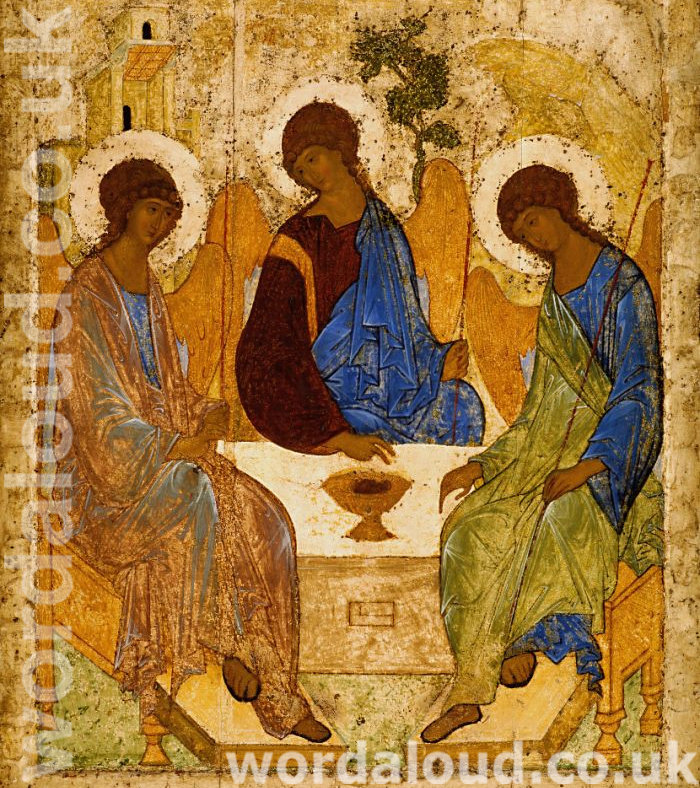Christian Art | Ascension | The Lord Jesus Christ Is Within You
Office Of Readings | Week 16, Thursday, Ordinary Time | A Reading From The Discourses Of Saint Ambrose On The Psalms | Light Of God’s Countenance
‘You have Jesus Christ within you.’
Saint Ambrose’s reflection on Psalm 44 (/Vg. 43) considers what might be one of the most persistent experiences in spiritual life: the feeling that God has turned away. Rather than offer abstract consolation, Saint Ambrose interprets this experience through the lens of faith, Scripture, and theology. His aim is to show that even when God seems absent, he remains present in a real and transformative way.
‘Why do you turn your face away?’ | A Cry of the Heart
This line from the psalm expresses the disorientation and anguish that people feel in suffering or spiritual dryness. Saint Ambrose explains that it is not that God has truly turned away, but that the human soul, overwhelmed by sorrow or sin, feels unable to perceive his light. In this state, the intellect becomes clouded, the heart unsettled, and faith challenged.
Ambrose reassures his readers that this is a common part of the spiritual journey, not a sign of failure. The experience of divine absence is a kind of test—not of God’s reliability, but of the believer’s memory and trust.
The Face Of God As Light And Recognition
In biblical thought, to see the face of God is to experience his favour, nearness, and presence. Ambrose reminds us that, just as we recognise a person most readily by the face, the soul recognises God most clearly when it perceives his light. This is not just poetic: light, for Ambrose, represents truth, grace, and spiritual clarity.
Ambrose draws on St Paul’s words in 2 Corinthians 4:6 to reinforce his point:
‘It is the same God who said, ‘Let light shine out of darkness,’ who has shone in our hearts to give the light of the knowledge of the glory of God in the face of Christ.’
This verse helps Ambrose connect the psalmist’s longing with the revelation of Christ, who is the visible image of the invisible God. Through Christ, God’s face has been definitively shown—and not just outwardly, but inwardly, within the human heart.
Jesus Christ, The Light Within
Ambrose emphasises that Jesus Christ now shines within the believer. This light is not an external comfort but an internal, spiritual reality. Once received, it does not fade—even when the believer is struggling. This inner light is a result of grace and can guide, sustain, and transform the soul.
Ambrose’s theological point is clear: God may seem absent, but he is never truly gone. His light, once granted, is imprinted on the soul—especially through baptism and faith.
Healing Faith | Peter And Zacchaeus
To support his interpretation, Ambrose draws on two biblical examples:
- In Acts 3, Peter heals the lame man by inviting him to ‘look upon us’. The man’s faithful attention opens the way to healing. Ambrose reads this as an image of Christ’s light working through the apostles.
- Zacchaeus (Luke 19), too short to see Jesus through the crowd, climbs a tree and catches sight of Christ. This moment changes everything: from a tax collector taking from others, Zacchaeus becomes a man who gives generously.
In both stories, the act of looking upon Christ (or those who represent him) brings not just insight, but transformation. Ambrose sees these as illustrations of what the psalm means by the light of God’s face.
‘Even If You Turn Away, Your Light Remains’
Ambrose reads the psalm’s line not as despair, but as an expression of faith in God’s constancy. Even if it seems that God’s face is hidden, the memory and imprint of that light remain in the soul. It is not erased by suffering, nor by silence.
He adds a final warning: if God were truly to withdraw his face, life would cease altogether. That he does not do so is a sign that his sustaining presence continues, even when we cannot feel it.
This is not just theology for Ambrose—it is pastoral wisdom. He is teaching his readers to trust that God’s grace endures, even in darkness.

A Reading From The Discourses Of Saint Ambrose On The Psalms | Light Of God’s Countenance
Why do you turn your face away? We think that God has turned his face away from us when we find ourselves suffering, so that shadows overwhelm our feelings and stop our eyes from seeing the brilliance of the truth. All the same, if God touches our intellect and chooses to become present to our minds then we will be certain that nothing can lead us into darkness.
A man’s face shines out more than the rest of his body and it is by the face that we perceive strangers and recognise our friends. How much more, then, is the face of God able to bring illumination to whoever he looks at!
The apostle Paul has something important to say about this, as about so many other things. He is a true interpreter of Christ for us, bringing him to our understanding through well-chosen words and images. He says: It is the same God that said, ‘Let there be light shining out of darkness’, who has shone in our minds to radiate the light of the knowledge of God’s glory, the glory on the face of Christ. We have heard where Christ shines in us: he is the eternal brilliant illumination of souls, whom the Father sent into the world so that his face should shine on us and permit us to contemplate eternal and heavenly truths – we who had been plunged in earthly darkness.
What shall I say about Christ, when even the apostle Peter said to the man who had been lame from birth Look upon us? The cripple looked at Peter and found light by the grace of faith: unless he had faithfully believed he could not have received healing.
When there was so much glory to be seen among the Apostles, Zacchaeus, hearing that the Lord Jesus was passing by, climbed a tree because he was small and weak and could not see the Lord through the crowd. He saw Christ and he found light. He saw Christ and instead of robbing others of their goods he began to give away his own.
Why do you turn your face away? Let us read it thus: even if you do turn your face away from us, Lord, its light is still imprinted upon us. We hold it in our hearts and our innermost feelings are transformed by its light.
For if you truly turn your face away, Lord, no-one can survive.
Christian Prayer With Jesus
Lord,
In times of sorrow or confusion,
when your face feels far from me,
help me to remember the light you have placed in my heart.
Let the face of Christ shine within me again.
Teach me to look to him in faith,
as the lame man looked to Peter and was healed,
as Zacchaeus looked and was changed.
Your presence remains, Lord,
even when my feelings say otherwise.
May your light guide me through the dark,
until I see your face fully in your kingdom.
Through Christ our Lord. Amen.
Glossary Of Christian Terms
Psalm 44 (/Vg. 43): The psalm is numbered 44 in the Hebrew and most modern Bibles and 43 in the Latin Vulgate. It is a psalm of lament and trust.
Vulgate: The Latin version of the Bible, used in the Western Church since the 4th century.
Septuagint: An early Greek translation of the Hebrew Scriptures, often used in the early Church.
2 Corinthians 4:6: A verse describing Christ as the one who brings God’s light into human hearts.
Theophany: A visible manifestation of God to humanity.
Incarnation: The Christian doctrine that God became human in the person of Jesus Christ.








